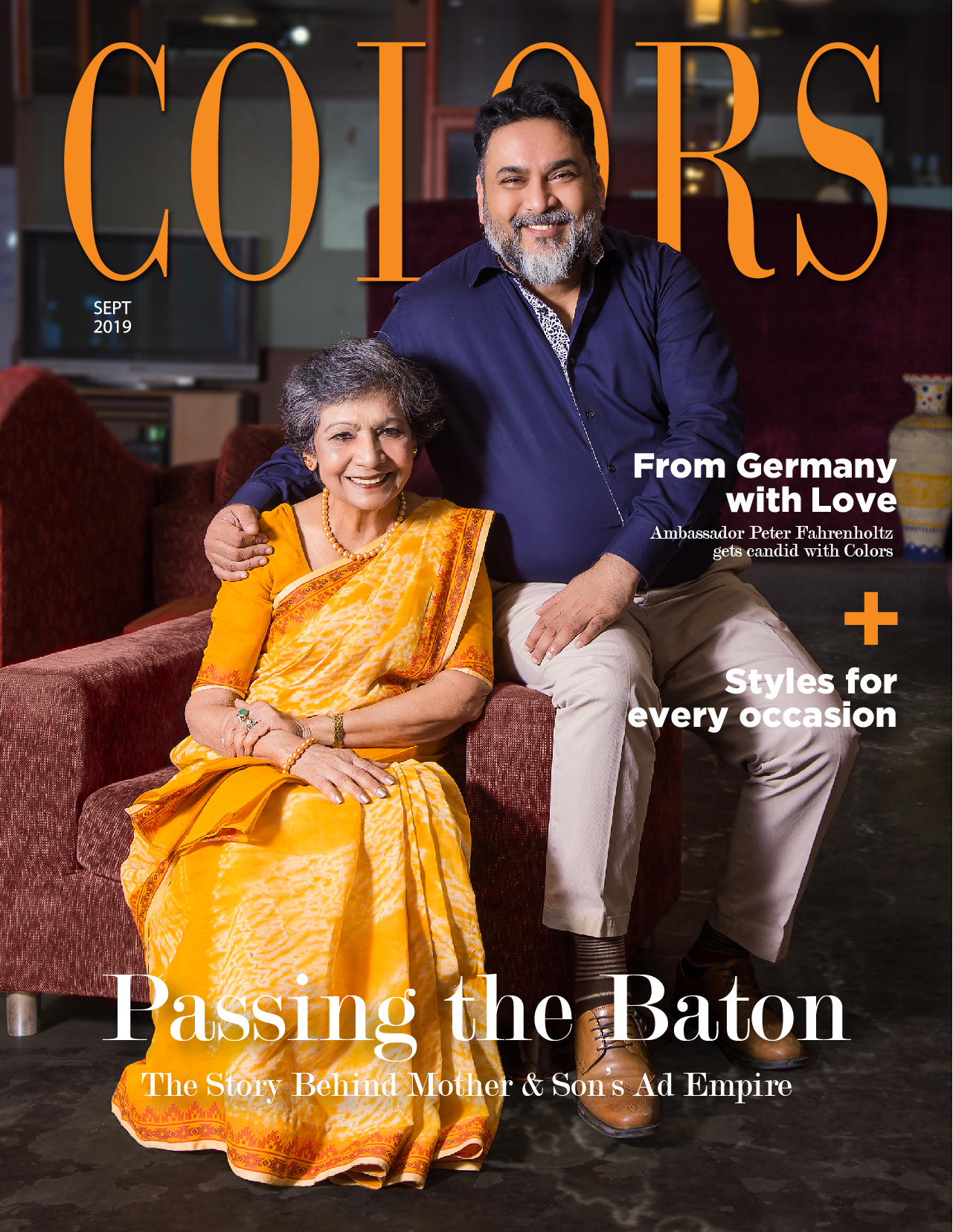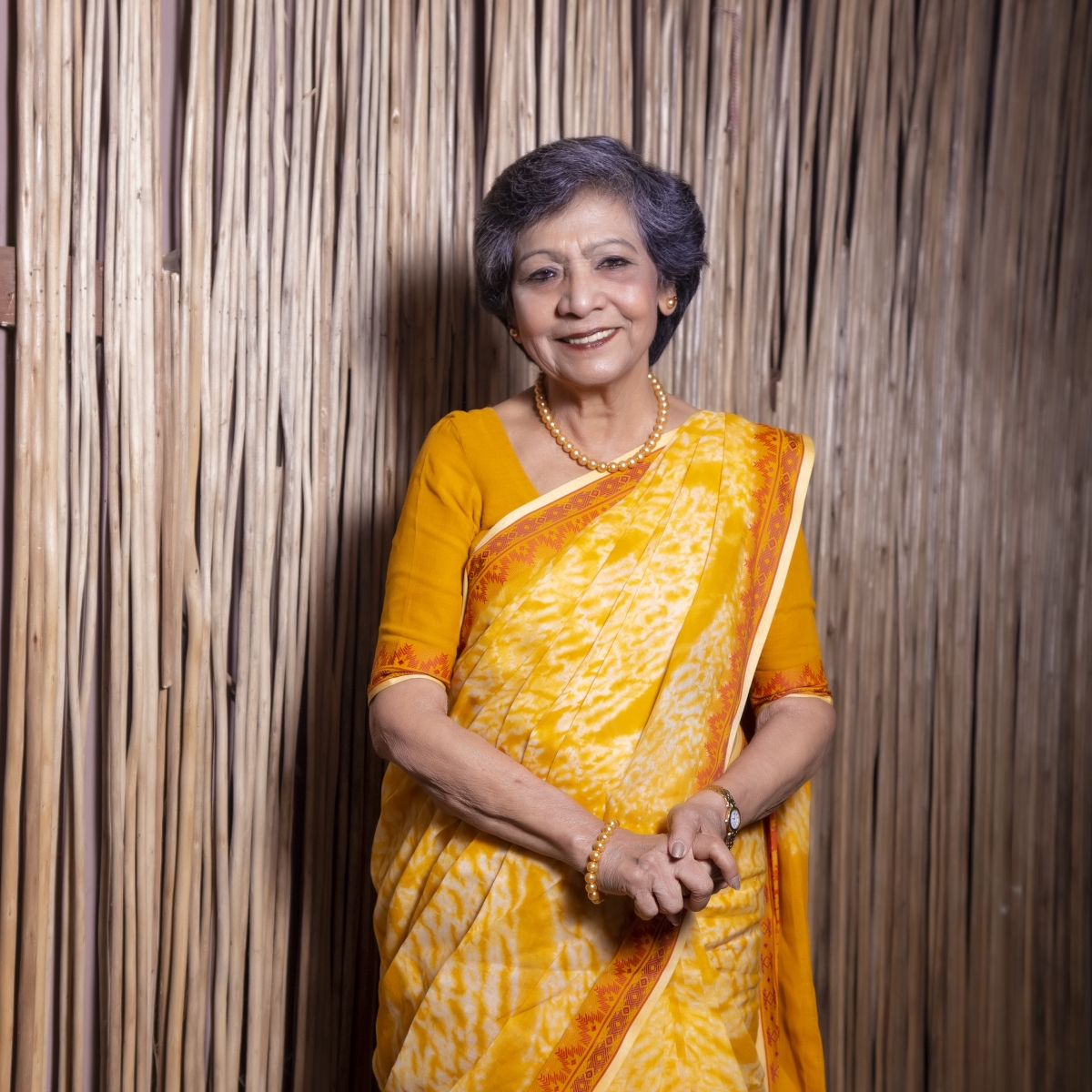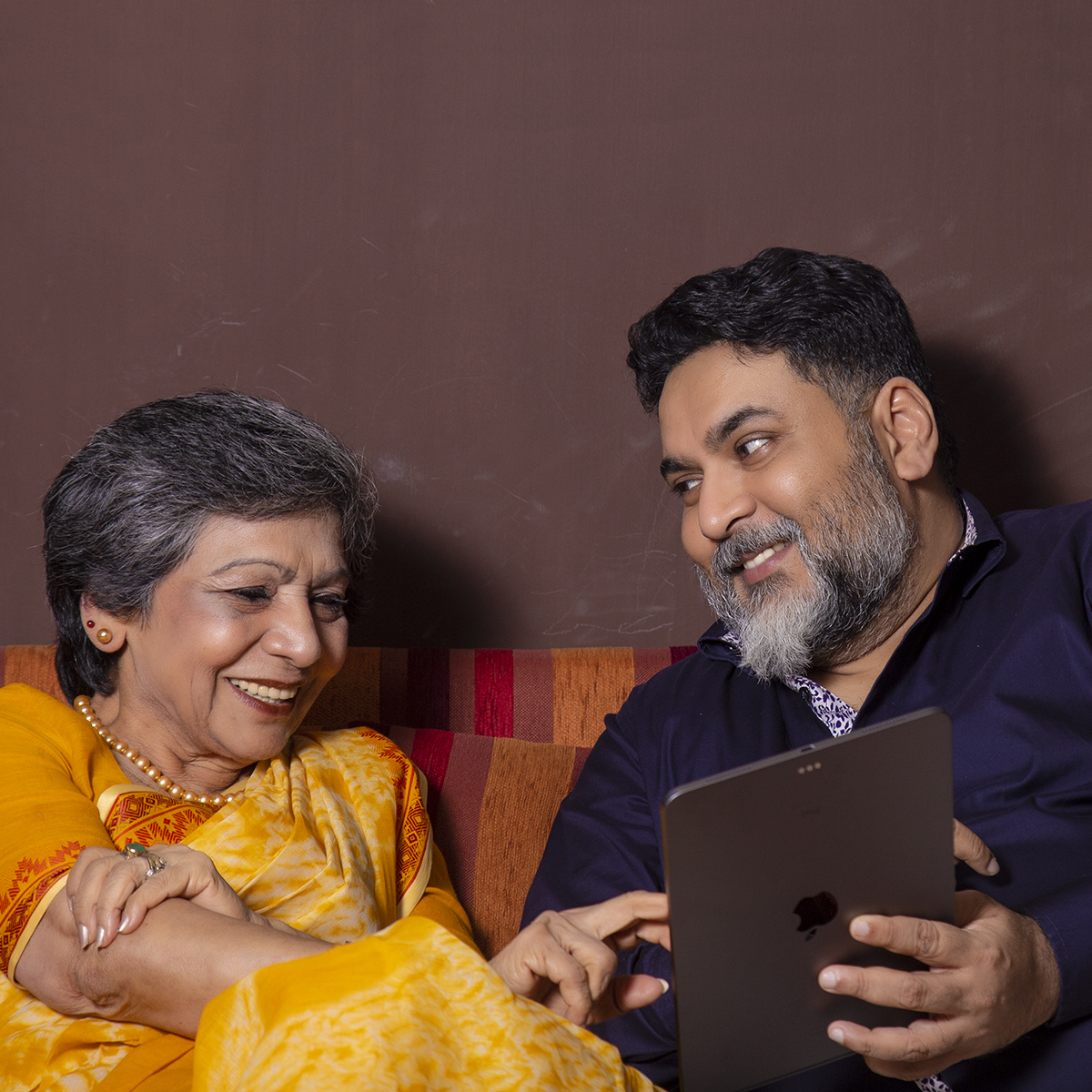Kickstarting the Advertising Landscape in Bangladesh

Founded 45 years ago, on July 4, 1974, Adcomm is the first advertising agency in Bangladesh which received the Campaign Asia-Pacific’s ‘South Asia Agency of the Year 2012 (Bronze)’ award. It was spearheaded by our cover star, Geeteara Safiya Choudhury. A renowned personality in the marketing domain, Geeteara was also a former Advisor with the status of a Minister to the Caretaker Government led by Fakhruddin Ahmed. Colors got into a conversation with this marketing guru to collect both tips and anecdotes of her spectacular journey thus far.

When taken to her room Geeteara welcomed us clad in a warm yellow ochre saree with an equally warm, if not more, smile. Despite a long interview and countless questions, the lady held on to her captivating smile throughout.
She claims that when starting out with an advertising agency there were hardly any products of the clients or competitions in the market and gradually as both grew, they had to put up a fight to get people’s attention and money. Down the line, people became more conscious and choosier. “Your product had to be good and your campaign had to say the right things. People would not settle for whatever anymore,” she recounts.
Previously, she recalls, they were only exposed to one TV channel and a couple of newspapers and their numbers escalated at an unprecedented pace as the media world evolved. Changes are constant even today; digital media is still taking up more exposure by the day while the radio almost died but got revived by new brands shaking things up.
Having worked in the industry for so many years Geeteara is open to new ideas and new ways of execution irrespective of who it is coming from. Young people, she points out, are enthusiastic, “and it is our duty to give them a scope to learn and hear them out”. She adds, “Sometimes they come out with good ideas and since I do not belong to that generation, I have a hard time understanding it but I will not hesitate to ask them to explain it to me.”
Even till date, Geeteara says she goes to local and international seminars and takes notes. Though her friends joke about it but for her keeping notes is reassuring. She then brings them back to the people of her agency to supplement her teachings.
The visionary leader emphasizes the importance of ‘context’ for marketing campaigns to gain momentum. According to her opinion, every country has values and norms that should be reflected by the marketing campaigns if it is to be loved by people.

Photo: Photographs by Kazi Mukul.
She cites an example where they had to do a campaign for a deodorant once, and at the time there was only Bangladesh Television to do it. As per BTV rules, the script has to be approved by them before being broadcast and the channel restricted her agency from showing the application process of deodorant and from using the word ‘armpit’ which almost made the advertisement impossible to execute. Nevertheless, she needed to do the campaign and did not give up. Geeteara insisted on investigating the situation a little more only to find out later that the word armpit did have a negative connotation. They then worked around the focused target audience who enjoyed the entertainment and instead of a television campaign executed a mime show to communicate to the audience exactly what the communication objective was. She got Mustafa Monwar to do the show for them and the client agreed.
The brilliantly executed campaign witnessed a staggering three-digit growth percent and set a precedent of how simple objectives can be achieved if there are a proper context and consumer taste and is kept in mind. “You have to be aware of what your consumers want to see and what they won’t like. It is true even today, no matter how many things have changed the fundamentals remain the same,” she observes.
About the beginning, she tells us that she had full faith that the industry would grow. She has a philosophy of advertising only the products that she and her family can use and is a believer that a good marketing campaign will only work when the product being advertised is great too. Her nationalistic roots have always ensured that she has stuck to advertising products that would benefit the country and the people.“I have always had the goal that I will handle brands that are ethical so that when I help them grow the country will grow as well,” Geeteara philosophizes.
When she started out she only had five employees who were her former colleagues and agreed to work despite having no assurance that they would get paid as she could not even afford a fan for her office which was smaller in size than her current room.
While she was struggling to establish Adcomm, she was once offered a lucrative job which entailed a multitude of fringe benefits including a 1600cc chauffeur-driven car, a cook, a gardener first-class travel along with free education for her children anywhere in the world. She refused it.
The offeror seemed fazed by her decision and assumed that she probably did not understand the offer. But Geeteara reassured him that she understood and still wanted to reject the offer solely because it was funded by aid. She did not refuse to work for a firm that was aid-funded because it would not help the country grow in a sustainable way and she was adamant about doing something of her own. Upon hearing this, the offer pulled out his drawer and took out his camera to take pictures of her. He gave her the film and asked for a copy to keep in case she ever became successful and if her dream came true.
Despite brimming with confidence as she took her leap of faith, young Geeteara might have not known back then that her dream would indeed come true.
Adcomm boasts of a list of many memorable campaigns but the founder’s favorite campaigns include mostly the social campaigns that they rolled out.
A particular campaign where they work to gather people to restore the eyesight for blind people with only Tk 500 is however particularly close to her heart. Through her nephew who is blind himself, she met people from Sweden who came all the way to Bangladesh to work on this project. While she had initially refused to meet them due to being busy. Her guilt overcame her and she later agreed to visit her nephew where she met these amazing people who, she admits, made her feel embarrassed. “Not only were they working on such a noble cause but they had come all the way to check if the children were doing all right and here I was almost refusing to show up merely because I was busy,” she exclaims.
Her inner self soon knew that she had to do more than just donate. She wanted to make a bigger impact and the only way to do so was to bring in more people to help. So, she asked for one out of three spots from British Oxygen, one of her clients, for an advertisement. She also convinced a filmmaker to make a film for the campaign at a bare minimum cost. Later she even requested BTV to give a special rate for the ad. It was almost as if her effort and intention found out ways in a situation where executing the idea seemed otherwise impossible. Her campaign made it big and through it, they raised around Tk 40-50 lakh (4-5 million). This is what, she says, makes her work fulfilling.
Amongst her accolades, she treasures the Fortune Magazine Award for women entrepreneurs the most. Upon being sent a letter informing her of this award, she was quick to throw it away fearing that she would be asked to put in a lump sum of money if she accepted the award. When they called her up to inquire why she wasn’t accepting, she frankly confessed that she would not like to buy an award. Surprised with her statement, the person on the other end of the call replied, ‘No ma’am, you don’t have to put in a single penny’. She was still not convinced then The US ambassador called and convinced her to accept the award and told her she would not have to pay any money.
Later down the line, Geeteara did win the award and went to Venice to receive it along with her husband. On stage, she specifically thanked four people: her father, grandfather, her husband, and her father-in-law for their support. When she got down the stage a foreigner came to her and jokingly said, “You know when you said four men, I almost deduced that you were probably going to talk about four of your husbands since you are a Muslim woman. Given how Muslim men can marry four times I thought it must be the same for the Muslim women.”
Everything she says is imbued with a deep sense of optimism. She takes us back to the time when they didn’t have any designations and how the idea is still rooted in how things work inside the organization. “Everyone here is just as important as I am, even the guys who serve us tea or the fellow who sweeps the floor. Everybody is equal and without any one of the employees work here would be harder,” she states. She is always up for a chit-chat with her employees and having fun. She even pleads guilty that she goes around and playfully snatches away chocolates from her employees at times.
All she expects from her employees is ‘honesty of purpose’. “They should be proud of what they do and they should come here because they love working here.” She adds sincerity and patience should also accompany this sense of purpose.
She reckons to work at an early age with a deep level of enthusiasm and getting promotion after promotion without a raise. Both as a writer initially and then from a copywriter to an executive vice-president at Interspan, she remembers having a great time doing what she loved to do. Being a voracious reader, she always took great pleasure in learning and reading new books. She used to pick up words and find joy whenever she was able to use a new word that she had picked up for a copy. Her enthusiasm to grow in her own right drove her towards progress that eventually led her into living her dreams.
After her marriage, she moved to Karachi and started working for a magazine called She, which was a women’s magazine and encircled empowerment. There she had the chance of interviewing the likes of great leaders such as Bangabandhu Sheikh Mujibur Rahman. When working there she used to go to advertising agencies with a colleague who had friends there. She was known to quickly scribble down copies with fervor to help them out with their work. When they started getting approved, she slowly wanted to write more copies.
When she came back to Dhaka, she was immediately offered a job at an agency called Interspan when they had heard good things about her copywriting. She left her work because of a difference of opinion with her boss and started her own agency after two of her clients requested her to do so. By then she already had her son and daughter but received full support from her parents and in-laws.
The lady embodying a commitment to learning sums up, “When you are young, you have this narrow tunnel vision and often we seem to forget that we can be anything that we want to be. But we have to be better than poor tunnel vision; we need to tell ourselves that we are bigger than that.”
“My father invented ‘just do it’ way before Nike did it and my husband knew the exact things to say to push me to do my best by being the bad cop,” she recollects.

No matter how busy her days got she would always spend a lunchtime with her two children and when they grew a little bigger she would bring them to her office. “That is probably how they got into advertising, After finishing their homework they would show great enthusiasm in what was being done here in the office,” she says.
She admits to being tough with her son and daughter when raising them up. Discipline was always a part of their routine. As advocated by Dr. Sufia Ahmed, she never hides anything from her children and that automatically has brewed a culture where her children never hide anything from her, and it was their lunchtime ritual to talk about their days with full disclosure.
Geeteara takes pride in her children joining her firm at the lowest level and slowly climbing up the ladder. When choosing a successor, she hired an external foreign agency and strictly asked everyone not to tell them that Nazim Farhan Choudhury was her son. Even on the day the decision was made the man who observed them for six months and claimed that Farhan Choudhury was the best choice, he didn’t know that he was the son of the founder and he thought Geeteara would perhaps prefer either one of the two female candidates who were in the list.
Fahima, Geeteara’s daughter, had already moved out and was successfully running her own advertising agency Ogilvy.
As we wrapped up the conversation, and she had to rush for another meeting she still insisted





